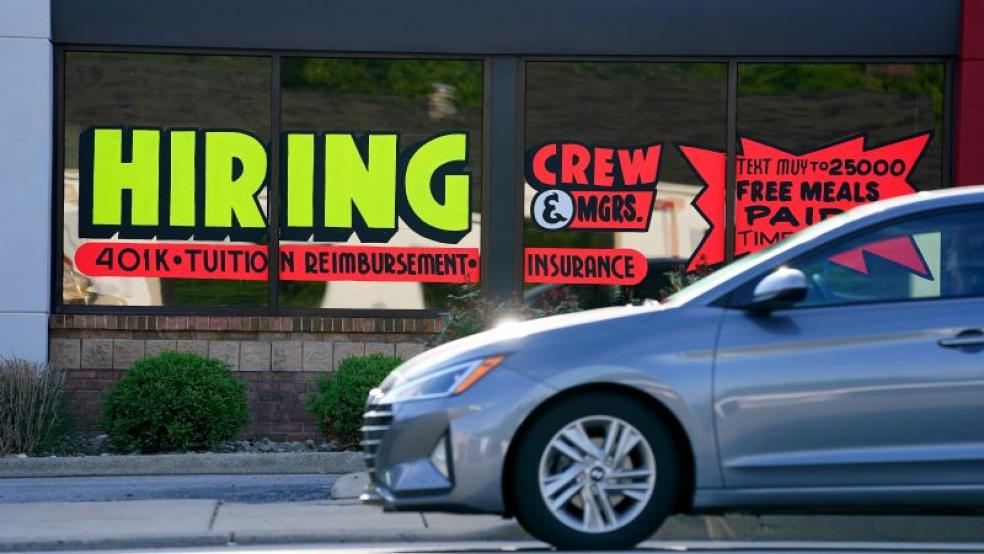U.S. employers added 339,000 jobs in May, the Labor Department reported Friday, blowing past expectations while signaling that the job market remains remarkably robust. The employment growth figures for March and April were revised upward, as well, adding another 93,000 jobs to this year’s total. And although the unemployment rate jumped three-tenths of a percentage point to 3.7%, joblessness is still near half-century lows, with the uptick driven in part by prime-age workers returning to a labor market that seems to be providing plenty of jobs.
Job growth was particularly strong in education and health services (+97,000), professional and business services (+64,000), government (+56,000) and leisure and hospitality (+44,000). Economist Elise Gould of the Economic Policy Institute wrote that “gains in both leisure and hospitality and government employment are particularly welcome news as they remain the sectors with the largest job shortfalls since before the pandemic,” adding that “those deficits are steadily shrinking month after month.”
The White House celebrated the news, highlighting the monthly numbers as well as the 13 million jobs added to the U.S. economy overall during the Biden administration and the still-low unemployment rate. “[T]he share of working age Americans in the workforce is at its highest level in 16 years,” President Biden said in a statement. “Meanwhile the annual inflation rate has fallen for 10 months in a row, and it’s down more than 40 percent since last summer. During that time, take-home pay for workers has gone up, even after accounting for inflation. … In short, the Biden economic plan is working.”
What recession? Although many analysts have been expecting the Federal Reserve’s anti-inflation campaign to produce a slowdown or perhaps a recession at some point this year, the latest jobs numbers suggest otherwise. “Holy moly, jobs growth comes in hot again,” University of Michigan economist Justin Wolfers tweeted. “Don't believe the doom-and-gloom talk. This economy is motoring along.” Wolfers noted that job growth averaged 283,000 per month over the last three months. “Recession? What recession?” he said. “There is literally no chance this is a recession.”
Joseph Brusuelas, chief economist at RSM, agreed. “Job growth remains robust in what is a historically tight labor market. Despite headlines around layoffs, the duration of unemployment stands near eight weeks, suggesting that jobs remain plentiful and that those who are displaced find employment, often at better wages, quite quickly,” he wrote. “As long as the economy continues to produce more than 200,000 jobs a month, this economy is not going to slip into recession.”
Stephen Stanley, chief US economist at Santander US Capital Markets, said Friday’s report is just one in a series that points to ongoing strength. “Not only the payroll figures but pretty much every other measure of labor demand (JOLTS job openings, online job listings, initial claims, etc.) indicate that the labor market remains hot,” he wrote in a note to clients, per Bloomberg.
The Fed’s next move: Most analysts have been expecting the Federal Reserve to pause its anti-inflation campaign at its meeting next week after raising interest rates 10 times in a row in an effort to slow the economy. Friday’s report raises questions about the possibility of another rate hike. Noted inflation hawk and former Treasury Secretary Lawrence Summers said that if the Fed does pause in June, it should be willing to consider a substantial increase in July.
“We are again in a situation where the risks of overheating the economy are the primary risks that the Fed needs to be mindful of,” Summers told Bloomberg Television’s David Westin. “If they don’t raise rates in June, I think they have to be open to the possibility that they may have to raise rates by 50 basis points in July if the economy continues to stay way hot and if inflation figures are robust.”
Still, many economists are saying that the strong jobs report is unlikely to be enough to change the Fed’s path, at least in June. “Today's jobs report should not materially increase the odds of a Fed hike in June given the short-run reaction function they have articulated with its presumption of a skip,” former Obama administration economist Jason Furman tweeted. “But it should raise the odds of a July hike,” he added. “And makes it even harder to see a cut later this year.”
Diane Swonk, chief economist at KPMG, said that while she doubts the Fed has finished its rate hike campaign, a pause in June is still likely. “Powell seems determined to skip the June meeting for rate hikes,” she tweeted Friday. “He has hopes of engineering a soft landing and has proven extremely good at corralling the cats. Also, a skip makes sense given sheer volume of Treasury bills and bonds that need to be issued, stating Monday.”




